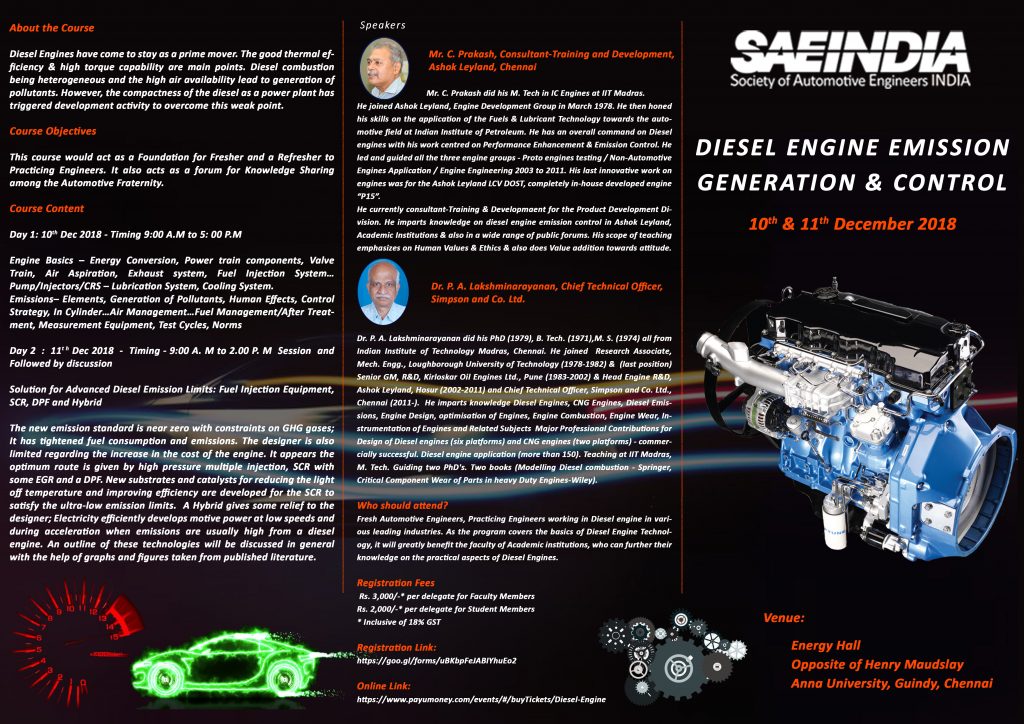Diesel Engine Emission Generation & Control
SAEINDIA PDP – “Diesel Engine Emission Generation & Control ” on 10th & 11th Dec 2018 at Anna University, Chennai
We are glad to inform you that we are conducting a Professional Development Program on the topic “Diesel Engine Emission Generation & Control” on 10th & 11th December 2018 at Energy Hall, Opposite of Henry Maudslay Hall, Anna University, Guindy, Chennai.
Course Faculty:
Mr. C. Prakash, Consultant-Training and Development, Ashok Leyland, Chennai
Mr. C. Prakash did his M. Tech in IC Engines at IIT Madras. He joined Ashok Leyland, Engine Development Group in March 1978. He then honed his skills on the application of the Fuels & Lubricant Technology towards the automotive field at Indian Institute of Petroleum. He has an overall command on Diesel engines with his work centred on Performance Enhancement & Emission Control. He led and guided all the three engine groups – Proto engines testing / Non-Automotive Engines Application / Engine Engineering 2003 to 2011. His last innovative work on engines was for the Ashok Leyland LCV DOST, completely in-house developed engine “P15”.
He currently consultant-Training & Development for the Product Development Division. He imparts knowledge on diesel engine emission control in Ashok Leyland, Academic Institutions & also in a wide range of public forums. His scope of teaching emphasizes on Human Values & Ethics & also does Value addition towards attitude.
Dr. P. A. Lakshminarayanan, Chief Technical Officer, Simpson and Co. Ltd.
Dr. P. A. Lakshminarayanan did his PhD (1979), B. Tech. (1971),M. S. (1974) all from Indian Institute of Technology Madras, Chennai. He joined Research Associate, Mech. Engg., Loughborough University of Technology (1978-1982) & (last position) Senior GM, R&D, Kirloskar Oil Engines Ltd., Pune (1983-2002) & Head Engine R&D, Ashok Leyland, Hosur (2002-2011) and Chief Technical Officer, Simpson and Co. Ltd., Chennai (2011-).
He imparts knowledge Diesel Engines, CNG Engines, Diesel Emissions, Engine Design, optimisation of Engines, Engine Combustion, Engine Wear, Instrumentation of Engines and Related Subjects
Major Professional Contributions for Design of Diesel engines (six platforms) and CNG engines (two platforms) – commercially successful. Diesel engine application (more than 150). Teaching at IIT Madras, M. Tech. Guiding two PhD’s. Two books (Modelling Diesel combustion – Springer, Critical Component Wear of Parts in heavy Duty Engines-Wiley).
About the Course
Diesel Engines have come to stay as a prime mover. The good thermal efficiency & high torque capability are main points. Diesel combustion being heterogeneous and the high air availability lead to generation of pollutants. However, the compactness of the diesel as a power plant has triggered development activity to overcome this weak point.
Course Objectives
This course would act as a Foundation for Fresher and a Refresher to Practicing Engineers. It also acts as a forum for Knowledge Sharing among the Automotive Fraternity.
Course Content
Day 1: 10th Dec 2018 – 9:00 A.M to 5:00 P.M
Engine Basics – Energy Conversion, Power train components, Valve Train, Air Aspiration, Exhaust system, Fuel Injection System … Pump/Injectors/CRS – Lubrication System, Cooling System.
Emissions– Elements, Generation of Pollutants, Human Effects, Control Strategy, In Cylinder…Air Management…Fuel Management/After Treatment, Measurement Equipment, Test Cycles, Norms
Day 2 : 11th Dec 2018 – Timing – 9:00 A. M to 2.00 P.M Session and Followed by discussion
Solution for advanced Diesel Emission Limits: Fuel Injection Equipment, SCR, DPF and Hybrid
The new emission standard is near zero with constraints on GHG gases; it has tightened fuel consumption and emissions. The designer is also limited regarding the increase in the cost of the engine. It appears the optimum route is given by high pressure multiple injection, SCR with some EGR and a DPF. New substrates and catalysts for reducing the light off temperature and improving efficiency are developed for the SCR to satisfy the ultra-low emission limits. A hybrid gives some relief to the designer; electricity efficiently develops motive power at low speeds and during acceleration when emissions are usually high from a diesel engine. An outline of these technologies will be discussed in general with the help of graphs and figures taken from published literature.
Who should attend?
Fresh Automotive Engineers, Practicing Engineers working in Diesel engine in various leading industries. As the program covers the basics of Diesel Engine Technology, it will greatly benefit the faculty of Academic institutions, who can further their knowledge on the practical aspects of Diesel Engines.
Brochure : https://saeindia.org/jbframework/uploads/2018/12/Brochure-Engine-v5.jpg
or : https://saeindia.org/jbframework/uploads/2018/12/Brochure-Engine1.pdf
Registration Details
Rs. 3,000 per delegate for Faculty Members ( Inclusive of 18% GST)
Rs. 2,000 per delegate for Student Members ( Inclusive of 18% GST)
Registration Link:
https://goo.gl/forms/uBKbpFeJABIYhuEo2
Online Link:
https://www.payumoney.com/events/#/buyTickets/Diesel-Engine
The number of seats is limited due to intense interactions anticipated. Kindly send the registration on or before 6th December 2018 through phone or mail.



